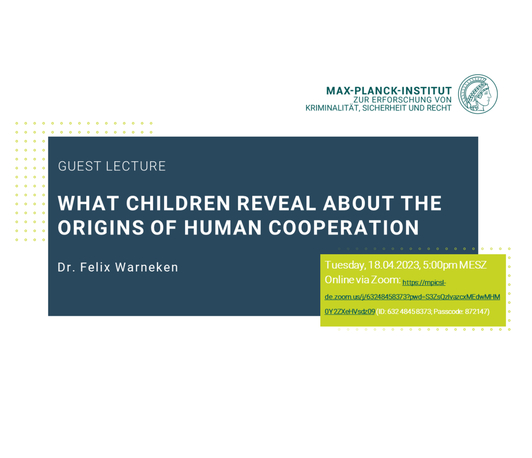What Children reveal about the Origins of Human Cooperation
Gastvorträge „Gesellschaft: Status Quo und normativer Wandel“
- Datum: 18.04.2023
- Uhrzeit: 17:00 - 19:00
- Vortragender: Dr. Felix Warneken
- Dr. Felix Warneken is Professor of Psychology at the University of Michigan and Director of the Social Minds Lab. Trained as a developmental and comparative psychologist, he and his students investigate the social behaviors of children, with a focus on the origins of cooperation and morality. He has received early career awards from the National Science Foundation, the Society for Research in Child Development, the Association for Psychological Science and the American Psychological Association. He was selected as a Fellow of the Radcliffe Center for Advanced Study, a Fellow of the Association for Psychological Science, Senior Fellow at the Society of Fellows at Michigan, and a Kavli Fellow of the National Academy of Sciences. His research has been featured in several documentaries by PBS NOVA, Arte, and Netflix.
- Video: mit Videopodcast (Link auf dieser Seite)
- Ort: Freiburg und via Zoom
- Raum: Seminarraum (F 113) und online | Gäste sind herzlich eingeladen!
- Gastgeber: Max-Planck-Institut zur Erforschung von Kriminalität, Sicherheit und Recht
- Kontakt: s.kuebel@csl.mpg.de

Humans are able to cooperate with others in sophisticated, flexible ways: assisting others who need help, working collaboratively in teams, and sharing resources according to what’s ‘fair’. How do humans accomplish these behaviors? In some views, we are initially driven by purely selfish motives and must be taught to be cooperative. Yet other views suggest we have a biological predisposition for cooperation that emerges early in childhood. I will discuss developmental studies with children and comparative studies with chimpanzees that provide insight into the origins of human evolution and development.
I will advance the hypothesis that young children already possess the foundational abilities to generate benefit through cooperation but require an extended period of development to learn how to balance benefits to self and others to maintain cooperation as a viable strategy. In addition, I present comparative work showing that chimpanzees possess several of the fundamental cooperative capacities previously thought to be unique to humans. However, humans differ in the extent to which cooperation is shaped by social norms: I will use fairness norms as a test-case, showing how fairness norms increasingly shape how children share their own resources and how they intervene against third parties who violate these norms.
What Children reveal about the Origins of Human Cooperation
Gastvortrag von Dr. Felix Warneken (University of Michigan) am 18.04.2023
– Gastvorträge „Gesellschaft: Status Quo und normativer Wandel“ –
https://www.youtube.com/watch?v=o855CXGVPow
– Gastvorträge „Gesellschaft: Status Quo und normativer Wandel“ –
